

|
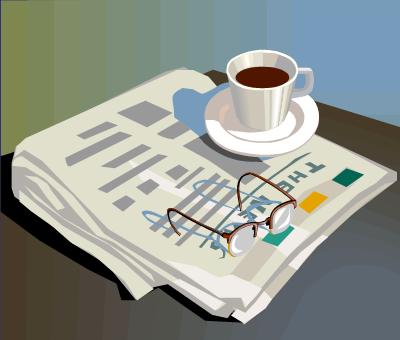 |
|
Omamacare V
|
|||||||||||||||||||||||||||
Please go to the new Coffee Coaster site implemented more gracefully in Wordpress. This page: http://brianrwright.com/CoffeeCoasterBlog/?p=2794 |
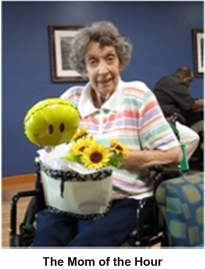 Ms. Phyllis Joy Wright (85), aka Mom, lives with me in my condominium in Novi, Michigan. She's a special-needs senior who has a genetic ailment called polycystic kidney disease (PKD), which has required hemodialysis three times a week since September 2009. This is the fifth in a series of seven columns that I have written or will be writing for purposes of:
Ms. Phyllis Joy Wright (85), aka Mom, lives with me in my condominium in Novi, Michigan. She's a special-needs senior who has a genetic ailment called polycystic kidney disease (PKD), which has required hemodialysis three times a week since September 2009. This is the fifth in a series of seven columns that I have written or will be writing for purposes of:
Since the previous heart incident requiring hospitalization, we have felt very positive because her heart ejection fraction has improved and the dialysis chemistry is within limits. We even get out to walk regularly again at the mall, only about a quarter mile these days, and she usually has to rest in between. So it's with alarm that at about 3:00 a.m. on August 1st I awaken to a faint voice outside my door calling my name repeatedly. It's Mom, and she's just sitting in the hallway between our bedrooms completely spaced, scary stuff; after stumbling around trying to get her up and to the bathroom, then back into the bedroom—it's really a fog now trying to remember—I finally call an ambulance whose people do their techie-power dance and cart Mom off to Henry Ford West Bloomfield (HFWB) emergency.[1]
This is the note I sent to friends and family[2] on the occasion:
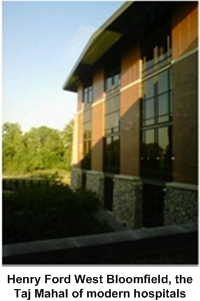 On the morning of Wednesday, August 1, Mom had a mild stroke. She's been at Henry Ford West Bloomfield since then, was dialyzed there yesterday, and will be dialyzed again tomorrow and probably be discharged into a so-called subacute physical therapy facility in Novi, either on Sunday or Monday. It's been a real learning experience, and I spoke with the neurologist this morning who showed me the actual results of the MRI (magnetic resonance image).
On the morning of Wednesday, August 1, Mom had a mild stroke. She's been at Henry Ford West Bloomfield since then, was dialyzed there yesterday, and will be dialyzed again tomorrow and probably be discharged into a so-called subacute physical therapy facility in Novi, either on Sunday or Monday. It's been a real learning experience, and I spoke with the neurologist this morning who showed me the actual results of the MRI (magnetic resonance image).
He expects she will recover most of her speech and cognitive capability. [I have already seen notable daily improvement since Wednesday.] That's the status, and thanks to modern medicine and, I guess, good fortune, my guess is she still has several months, even a few years of quality life to go. I appreciate all your thoughts and, yes, prayers. And so does she.
Basically, Mom, who is on hemodialysis as a consequence of polycystic kidney disease (PKD), developed cardiomyopathy (weak heart muscle), which led to a couple of heart 'incidents' in October and November of 2011. She was diagnosed as having paroxysmal atrial fibrillation (afib) and given medications to slow and steady her heart rate, mainly carvedilol (Coreg). Everything was going along fairly well—her cardiologist tested her in May 2012 and the ejection fraction of her heart had improved from 20% to 45%, further, a heart catheterization showed extremely clean blood vessels there—until about 6-8 weeks ago when she became constantly lethargic and 'faintheaded.'
Since we were doing well with the meds and her dialysis and the cardiologist's heart performance measurements were right on the money, I really didn't think afib was a factor in her lack of energy. But we saw the primary care physician three times in that period, he noted about two weeks ago that the afib was present, and he upped the carvedilol. So I figured there we had nipped the afib problem in the bud; on the followup visit with primary care she still complained of lack of energy and faintheadedness but he thought her signs were good. Just continue with the conditioning. [I was beginning to think the lack of energy was due to a drug interaction—though she was down to only four drugs.]
Bottom line, I did not fully realize:
Frankly, neither the cardiologist nor primary care gave me the impression that they thought stroke was/is a likelihood—and if they mentioned that pooling-clotting sequence in the atrium, then I don't remember hearing it.
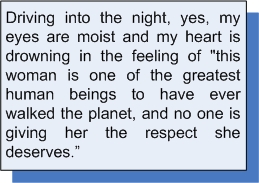 In all the conversations about using Coumadin, the celebrated blood anticoagulant du jour—the cardiologist was more insistent than the primary care or the dialysis nephrologist—none of them thought that the reduction in stroke risk was an overwhelming counter to the generally reported problems with bleeding... which presents another set of risks through falls and so on. So since we all basically felt that stroke was unlikely, why bother with Coumodin? Well, it looks like maybe we should have gone that way. And the conversation this morning with the neurologist convinces me that we 'gotta do it.'
In all the conversations about using Coumadin, the celebrated blood anticoagulant du jour—the cardiologist was more insistent than the primary care or the dialysis nephrologist—none of them thought that the reduction in stroke risk was an overwhelming counter to the generally reported problems with bleeding... which presents another set of risks through falls and so on. So since we all basically felt that stroke was unlikely, why bother with Coumodin? Well, it looks like maybe we should have gone that way. And the conversation this morning with the neurologist convinces me that we 'gotta do it.'
So believe it or not I'm in a good place right now. Looking at the MRI this morning and then, months ago, at the blood flow in the coronary vessels, is just really humbling. The functioning of the brain and heart are so truly magical! I feel a reverence, perhaps not in the theistic vein (no pun intended) but in how they are so remarkable in the cosmos. Can modern engineering make a pump the size of a fist that pumps continuously without maintenance for 85 years with a total output of 58 million gallons?[3]
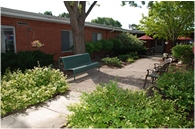 Stroke is a big subject and I'll tell you, when I first see Mom lying in the stroke center bed at HFWB, then realize how she has lost psychomotor skills and awareness of where she is, even who she is, I break up inside. Moreover, what she does express is a wordless appeal that comes across as "put me out of my misery!" Walking out into the parking lot on that first day, tears well up in me like a wave. Only, I don't let them come fully. Driving into the night, yes, my eyes are moist and my heart is drowning in the feeling of "this woman is one of the greatest human beings to have ever walked the planet, and no one is giving her the respect she deserves."
Stroke is a big subject and I'll tell you, when I first see Mom lying in the stroke center bed at HFWB, then realize how she has lost psychomotor skills and awareness of where she is, even who she is, I break up inside. Moreover, what she does express is a wordless appeal that comes across as "put me out of my misery!" Walking out into the parking lot on that first day, tears well up in me like a wave. Only, I don't let them come fully. Driving into the night, yes, my eyes are moist and my heart is drowning in the feeling of "this woman is one of the greatest human beings to have ever walked the planet, and no one is giving her the respect she deserves."
I give myself the relief of experiencing the immensity of sadness, and yes, I do let some tears come for that. But only so long. I'm not done yet. She's not done yet. We're not going to give the bastards the satisfaction of her going quietly into that great night. And by golly she improves, rapidly.[4] The next day, and the day after that, in about three days she has recovered some speech and is getting close to able to eat solid food. Her brain outage makes me realize how the simplest actions we take for granted go away in a heartbeat if we lose the corresponding brain circuitry. We don't swallow, we don't see or hear or taste or smell, we don't talk, we don't 'toilet,' and we don't operate the TV remote.
So now comes what they call subacute rehabilitation. A new experience. The insurance coverage enables a choice of facilities, so I take an afternoon wandering through the options provided in brochures by the discharge case worker. The first place, call it Option 1, is near the condo and looks the most basic, I feel I have to give a fair shake to everyone.
Well, getting into the bare bones joint is a challenge, I meet the nice lady I talk to on the phone, but have to thread my way through angry looking men in wheelchairs all hovering around the entrance—I learn later these are VA guys. Maybe I caught them on a bad day. Option 1 does not quite present the 'Romanian Orphanage' motif, but damned close, and I'll be damned if I put Mom in here for a microsecond. See ya, don't wanna be ya.
Next, Option 2, is where she ultimately winds up, The Novi Manor. But before deciding I proceed further to the most contemporary of the three options, a glamour-corporate suburban option with single-bed rooms. I don't even remember the name now, call it Option 3. She can go there, Blue Cross covers it, it's more of a drive for me to visit her. But very modern, all the bell and whistles you'd see on Oprah or in Southern California—golf courses nearby, middle of an upscale condo-living association.
But as the sales lady walks me around I don't get the feeling that there are any real people in here, I mean staff or patients. In fact, I see very few individuals in the hallways or common areas. Connection and continuity? [My two catch phrases now for what modern health and senior care need: not gonna happen here in CorporateCarePleasantVilleScenicVistaRidgeFoxRun.]
After threading my way over the speed bumps and out the guarded gate, I hasten my butt back to the the Novi Manor and lay down my cards, make the commitment. Real people here. It has double occupancy in the rooms and is older, probably built in the late 1960s or 1970s, but the aisles are wider, and uncluttered by the Bedlam look of Option 1. Also, there are PEOPLE, everywhere—both staff and patients. It looks more structured than Option 1 and more peopled than Option 3. Location is perfect, right around the corner from my condo. The sociology draws me. The nursing-assistant care givers are many, predominately 'sisters,' Shatara is a young woman with a beautiful smile and a thoroughly loving manner. I'm getting ahead of myself...
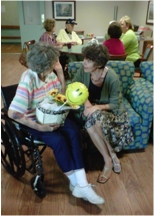 Laura handles admissions and makes me feel this is the place to be, a place with a "Lotta Love." A few days later, Mom is discharged from HFWB, and I drive her down here. Mom is still feeling the effects of the stroke, but steadily improving; she doesn't fully understand the need to be here, and wants to go home. But Shatara, mainly, who is the attendant in Wing B easing Mom into her room—shared with an unfortunate younger woman with MS—makes Mom feel comfortable. Virtually all the attendants in the B-Wing come to looovve my mother. And Mom comes to love them, too, very quickly, showing these girls affection.
Laura handles admissions and makes me feel this is the place to be, a place with a "Lotta Love." A few days later, Mom is discharged from HFWB, and I drive her down here. Mom is still feeling the effects of the stroke, but steadily improving; she doesn't fully understand the need to be here, and wants to go home. But Shatara, mainly, who is the attendant in Wing B easing Mom into her room—shared with an unfortunate younger woman with MS—makes Mom feel comfortable. Virtually all the attendants in the B-Wing come to looovve my mother. And Mom comes to love them, too, very quickly, showing these girls affection.
[Believe me, some of the tenants of the Manor o' Love are obviously major pains in the ass. That's another reason the staff love my mom, who doesn't whine and tries to help whoever is helping her.]
They also like me, too, maybe because they appreciate a man who takes the time to care for his mother. I'm as old as some of the men in here as patients; still a palpable natural energy of attraction moves between and among us.
My Gold Star help of the Manor o' Love:
| Shatara | Kuan | Tasha | Teslin |
| Tatum Smith | Hartenz | Tracy | Paula: Therapy |
| Sade | Lorraine | Tina | Carol |
| Miss Massey | Gwen | Sonya | Teri: Social Director |
| Chemora | Sarah (2) | Solo | Laura: Admissions |
| Melissa: OT and PT |
Bless you, girls!"
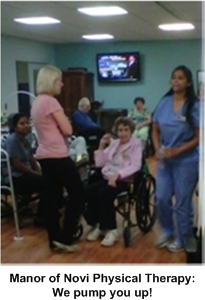 So this is how it goes for about a month, as mother slowly recovers. In fact she recovers completely in speech and thinking, and walks out of there by the end of August.
I'll tell you though, at the beginning I didn't know what to expect. A lot of the individuals in these rehab facilities are there for the duration. It isn't rehab for them, it's Heaven's Little Waiting Room. There are enough people in these facilities, most travel in wheelchairs, that someone with their wits about them will have someone to chat with, someone who will also be getting out. But the sad fact is, 50% of the ones inside are going to die here... and not to the sound of trumpets, or, with caring, loving family in attendance.
So this is how it goes for about a month, as mother slowly recovers. In fact she recovers completely in speech and thinking, and walks out of there by the end of August.
I'll tell you though, at the beginning I didn't know what to expect. A lot of the individuals in these rehab facilities are there for the duration. It isn't rehab for them, it's Heaven's Little Waiting Room. There are enough people in these facilities, most travel in wheelchairs, that someone with their wits about them will have someone to chat with, someone who will also be getting out. But the sad fact is, 50% of the ones inside are going to die here... and not to the sound of trumpets, or, with caring, loving family in attendance.
I make a point of chatting up anyone who is conversant. On one of the first days, I wander outside into the driveway, which doubles in the evenings as a place for meeting and conversation, and encounter a truly remarkable woman named Virginia. What's that I smell, yup, Virginia is dragging on a (tobacco) cigarette! Virginia is an amputee and it has something to do with an auto accident, but you never know. My suspicion is diabetes. At any rate, such conversations are special, you realize immediately the absolute reality of life and how you, yourself, are a humble part of the Great Mandela, makes you quiet inside. [5]
As for the healthcare system, itself, Mom is getting the best. She is fortunate to have the benefit of Blue Cross from her days as a public employee, a community college teacher in the state of Michigan. My quick answer to the 'healthcare problem' is to give or to get everyone health care of the quality and amount as what my mother has for a reasonably low price. You don't need the government to do that, simply a cooperative approach and elimination of corporate privilege. In part VI I'll discuss in more detail what such a quality system looks like in my experience.
This is summer of 2012 and Mom is coming back, back to the cat and to my exquisite home cookin'. I'm hoping for another good run of relatively good health for her, maybe two. It's like the old joke about the ad in the personals for a dog: "has a couple of broken legs, one eye, wheezes and is hard of hearing. Answers to the name Lucky!" So long as Mom's quality of life continues—in her mind—to be enough, I'll do what I can to keep her luck intact.
[1] Not to be judgmental, but one of the techs, a woman, is grossly obese; she seems capable enough and gets up and down the stairs all right and she can probably bench press three of me, but she's at least 300 pounds. As a general observation, portal to portal, healthcare workers are at least as out of shape and porked out as the general American public. Just seems awry.
[2] Emphasis on friends. The remnants of my immediate family since my good brother died in 2007 have disconnected from my mother and me, for, well, you truly wouldn't believe it, reasons.
[3] Pulled these numbers off the Web somewhere and would not stake my life on them. But 58 million gallons = ~ 7.5 million cubic feet = a room 100 feet on a side 750 feet high. A lot of blood pumped in a lifetime.
[4] One of the young neurologists, who is quite impressive knowledge-wise, and in his ability to communicate it, nevertheless ventures the judgment that Mom seems "incredibly weak." He also suggests hospice as a possible option. Which I will look into. He simply doesn't anticipate Mom's resilience which is to show shortly thereafter. The moral of the story: "Where there is life there is hope, and vice versa." Attitude and support overcome large obstacles.
[5] My pitch for advocates and for young persons 'entering' connecting to old persons 'leaving.' The 'quiet inside' feeling is the key to spiritual growth, and makes a child into a mature, confident, loving adult without force or violence. An entire column of its own.
###
2012 August 13
Copyright © Brian Wright | The Coffee Coaster™
Henry Ford Hospitals, Atrial Fibrillation, Stroke, The Manor of Novi, physical therapy, assisted living, nursing care, health care system, socialized medicine
| Publish Fee: $25 Donation |  |
|||
| |
|
Main | Columns | Movie Reviews | Book Reviews | Articles | Guest |